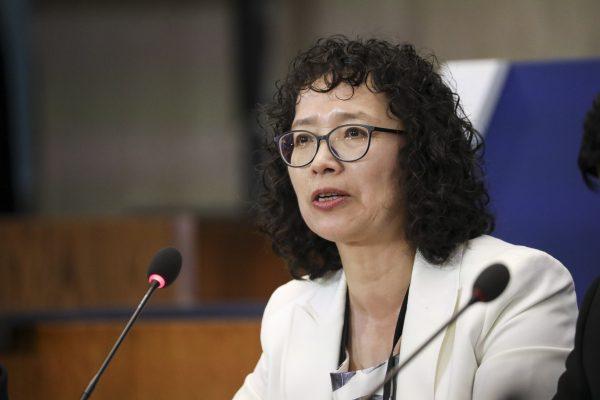Five representatives of the spiritual discipline Falun Gong met with U.S. State Department officials on July 20, as the group commemorated the 21st year of an all-out persecution campaign unleashed by the Chinese regime.
Assistant Secretary of State Robert Destro and Sam Brownback, U.S. ambassador at large for international religious freedom, who attended the meeting via phone, especially expressed concerns about the continued practice of forced organ harvesting from Falun Gong practitioners, according to adherents who relayed contents of the discussion with The Epoch Times.
In June 2019, an independent people’s tribunal in London concluded, after a yearlong investigation, that forced organ harvesting has taken place in China for years “on a significant scale,” with Falun Gong practitioners as the main source of organs. In its final judgment in March, the tribunal said this human rights crime was still in practice, stating that the “tragically unchecked action allowed many people to die horribly and unnecessarily.”
July 20 marked the 21st anniversary of the Chinese regime’s launch of a far-reaching suppression campaign on Falun Gong, an ancient Chinese discipline with meditative exercises and moral teachings centered on truthfulness, compassion, and tolerance.
Among the attendees was Zhang Yuhua, a Falun Gong practitioner originally from Jiangsu Province, who went through repeated arrests and police harassment for refusing to renounce her beliefs.
Zhang, 59, a former dean of the Russian department at Nanjing Normal University, spent a combined period of 7 1/2 years in prison before escaping to the United States in 2015.
Zhang recalled having to stand for days on end inside a prison cell, without any rest or sleep. Her body swelled up due to the torment—first her feet and legs, then her hands and arms.
“It’s not just one day, two days, or a week. They make you stand until you break down,” she told The Epoch Times, adding that she easily fell and fainted during that period. The longest duration that authorities forced her to stand was more than 50 days.
Zhang’s husband, Ma Zhenyu, was sentenced to three years in prison for the “sole reason of sending six letters to Chinese communist leaders” concerning Falun Gong and the persecution, according to Zhang, who has not been able to contact him since 2018. Ma had been in jail for a total of around seven years prior to that, Zhang said.

Asked about the meeting, the State Department referred to public statements about the Falun Gong persecution but did not provide further details.
Levi Browde, executive director of the Falun Dafa Information Center, said that Beijing’s drawn-out persecution campaign of Falun Gong has allowed the regime to develop a systematic mechanism to suppress other religious groups and dissidents, such as Uyghurs, house Christians, and Hongkongers, to “not just to break a person, but to force that person to to profess their allegiance to the Communist Party.”
“They really honed that process on Falun Gong,” he said.
“My thoughts today are with Falun Gong practitioners in China who have suffered 21 years of persecution at the hands of the PRC [People’s Republic of China] government. Harassed, arrested, imprisoned, and brutalized for their beliefs, we stand with them in solidarity,” he wrote.
The U.S. stance will likely spur further action from other countries to expose China’s human rights abuses, Zhang said in a recent interview, calling it an “unstoppable trend.”





